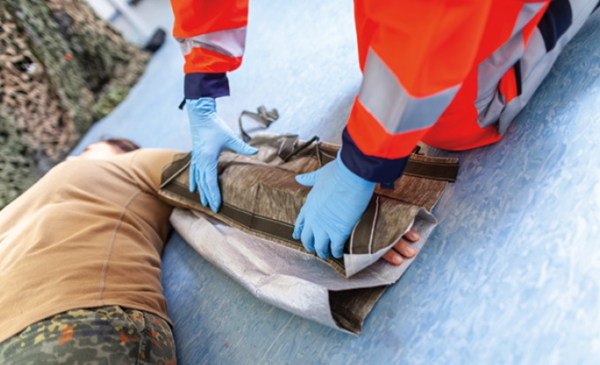An EMRA travel scholarship helped add important skills that one recipient hopes never to need - yet is glad to have at the ready.
You're out of the hospital enjoying a day off when suddenly the unthinkable happens in your community: a mass shooting. You find yourself at the scene with dozens of victims, many of whom are critically ill and require immediate assistance. How do you respond?
I got to practice and train for this scenario, thanks to the Tactical EMS Scholarship from EMRA and Mercyhealth. As I was entering my final semester of medical school, I had the honor of being selected for the EMRA Tactical EMS Scholarship. EMRA offers accepted members $500 for travel expenses to attend a tactical EMS course at Mercyhealth in Janesville, Wisconsin. Mercyhealth also waives the registration cost for the course and provides hotel accommodations. There are two courses: the Tactical EMS (TEMS) course (40 hours over 3 days) and the Tactical Emergency Casualty Care (TECC) course (which is 8 hours), which I attended.
Since I had no prior EMS experience, I arrived on the day of the class not entirely sure what to expect. There were 8 of us, including a resident physician, EMTs, firefighters, and police officers from the area. A police officer and a paramedic who both operate in austere and dangerous environments regularly instructed our class. The TECC course focused on providing immediate care to shooting victims in the event that you are the first responder (either intentionally or through circumstance).
I learned how to assess and manage gunshot injuries in the first half of the day. While we as emergency physicians are taught to always go through our ABCs when treating a trauma victim, this course taught me the BATH pneumonic for how to prioritize gunshot injuries:
- Bleeding
- Airway
- Tension pneumothorax
- Hypothermia
BATH is how many first responders approach a gunshot victim on scene. The instructors went through this pneumonic and taught us how to assess and manage injuries within these domains. We learned how to apply tourniquets, pack wounds, place nasopharyngeal airways, perform needle decompressions, place victims in thermal blankets, and even how to use ropes to move victims in the event that you need to rapidly extricate a wounded person from a dangerous area. We had mannequin sessions interspersed throughout our lectures to practice what we just learned.
The second half of the day was the practical portion in which we ran a simulation where we would apply the skills we learned in the morning. We were all given first aid bags filled with the supplies we would need and split into teams of 4.
Like most residents, I had been through a lot of simulations in medical school — but all of those assumed I was in the hospital setting, where the loudest stimulus I had to worry about was a beeping monitor. This was incredibly different.
Our simulation started as we entered a very poorly lit hallway and found a mannequin on the ground. Trying to stabilize a patient who was bleeding out in near darkness was unlike anything I'd been asked to do before. After the initial mannequin was stabilized, we moved between 3 different settings: a movie theater, a classroom, and a dance club. Each setting had multiple victims with differing injuries requiring us to use all of the skills learned earlier in the day. Each setting also had different kinds of disorienting sounds: a loud movie, screaming, and loud techno music complemented by strobe lights. The intent of all of this was to completely overwhelm the senses. Fortunately, we were able to run the simulation twice, and I handled the sensory overload better on my second run.
I cannot recommend the TECC scholarship highly enough. It teaches an invaluable skill set that, while I hope to never need, is incredibly important to know. The simulation also forced me to think and act in an environment I had never encountered before. Finally, it gave me even more respect for my EMS, fire, and police colleagues. It occurred to me after the simulation that, while I never expect to operate in such a dangerous environment, they are all ready, willing, and able to do so at a moment's notice.



